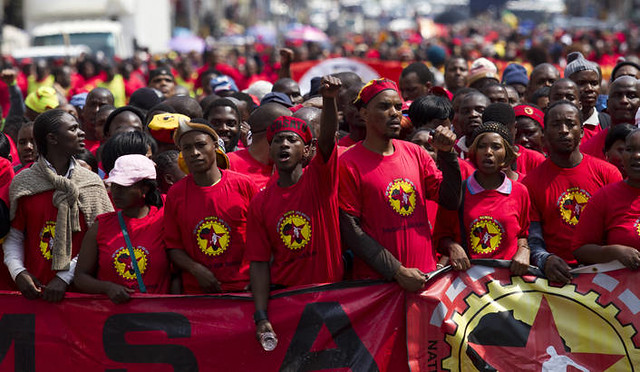UNIONS representing thousands of security guards employed in the private security sector are on Wednesday set to announce plans to pressure companies to pay back millions of rands allegedly deducted irregularly from workers’ salaries.
The unions which include the National Union of Metalworkers of SA (Numsa) , SA Transport and Allied Workers Union (Satawu), Kungwini Amalgamated Workers Union (KAWU) and the Abanqobi Workers Union (AWU) said in a joint statement they will unveil a detailed Programme of Action (PoA) they will undertake to exert pressure on noncompliant companies to pay back money irregularly deducted from workers’ salaries.
The development follows a report by Mukurukuru Media in January, detailing how security companies, some of which are doing business with government have been irregularly deducting funds amounting to millions of rands from workers’ salaries under the guise of providing medical benefits.
The unions who have reported the matter to the Council for Medical Schemes for investigation, say that the probe affects more than 30,000 security guards and total to about R50-million in deductions so far.
According to a March 2021 agreement with the National Bargaining Council for the Private Security Sector (NBCPSS), a health insurance benefits scheme for the sector was set to be implemented following the signing of a collective bargaining agreement with employers and unions.
The NBCPSS is registered in terms of the Labour Relations Act and cites its primary aim and purpose as “to regulate, maintain and enforce the terms and conditions as set out in the Main Collective Agreement. According to the Main Collective Agreement, registered trade unions and employer organisations represent employees falling within the scope of the security sector.”
According to the agreement, the scheme was to be administered by Affinity Health and workers were to pay a compulsory R250 monthly insurance, half of which was deducted from salaries.
The benefits include chronic disease management and medication, doctor consultations, hospital and casualty benefits, including an HIV and TB management programme.
However scores of workers have reported to the unions that although the funds were being deducted monthly from their salaries, they were not receiving health benefits and Affinity Health was not receiving the proceeds from the pay deductions.
Security guards speaking on condition of anonymity told Mukurukuru Media they did not even receive the medical benefit cards they were supposed to be given to help them access health services.
This has left workers, many of them poorly paid and unable to afford private health care, forced to join the long queues at public health care facilities even though they contribute funds to help them access private health care.
Zongezile Baloyi, executive corporate services at the Council for Medical Schemes, confirmed receipt of the complaint.
“The matter under enquiry was lodged with the CMS and the alleged non-compliance by the exempted entity was reviewed in consultation with internal units,” said Baloyi.
He did not reveal the exact details of the probe or whether the CMS is investigating other companies not mentioned in the letter by Raselo.
“We cannot say as our internal processes are still underway. We are not in a position to pronounce on this at this stage,” he said, adding that a preliminary review will be issued.
A spokesperson for the Private Security Industry Regulatory Authority (PSIRA) said the body had not received the said complaint brought by the unions against companies that failed to comply with the Collective Bargaining’s Main Agreement.
“The issues raised in the document are Collective Bargaining Council issues and not part of the PSiRA mandate. They therefore must be directed to specific offices such as UIF, COID, PSSPF and NBCPSS. PSIRA plays an oversight role within the Private Security Industry (PSI) therefore can assist in directing the matters to the right offices,” said Mpho Sechoaro, PSIRA’s deputy director: training and communication.
In its 2021/22 annual report, the PSIRA said there were 586,042 registered active security officers as at the end of March last year and 11,540 active registered private security businesses
The Unions organised under the Private Security Sector Guards of South Africa is set out its plans in Sandton, Johannesburg on Wednesday.
“The security guards remain resolute that all progressive unions should find the courage to join the resolute fighting ranks of KAWU, AWU, SATAWU and NUMSA & collectively stand together to defend all the hard won gains of workers and to fight to improve their benefits & conditions.” news@mukurukuru.co.za

[…] Unions gun for security companies to pay back millions ‘irregularly’ deducted from worke… […]